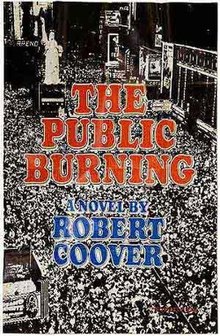
Richard Milhous Nixon was the 37th president of the United States, serving from 1969 to 1974. A member of the Republican Party, he previously served as a representative and senator from California and was the 36th vice president from 1953 to 1961 under President Dwight D. Eisenhower. His five years in the White House saw reduction of U.S. involvement in the Vietnam War, détente with the Soviet Union and China, the first manned Moon landings, and the establishment of the Environmental Protection Agency and Occupational Safety and Health Administration. Nixon's second term ended early, when he became the only president to resign from office, as a result of the Watergate scandal.

The Watergate scandal was a major political scandal in the United States involving the administration of President Richard Nixon from 1972 to 1974 that led to Nixon's resignation. The scandal stemmed from the Nixon administration's continual attempts to cover up its involvement in the June 17, 1972, break-in of the Democratic National Committee headquarters at the Washington, D.C., Watergate Office Building.
The silent majority is an unspecified large group of people in a country or group who do not express their opinions publicly. The term was popularized by U.S. President Richard Nixon in a televised address on November 3, 1969, in which he said, "And so tonight—to you, the great silent majority of my fellow Americans—I ask for your support." In this usage it referred to those Americans who did not join in the large demonstrations against the Vietnam War at the time, who did not join in the counterculture, and who did not participate in public discourse. Nixon, along with many others, saw this group of Middle Americans as being overshadowed in the media by the more vocal minority.
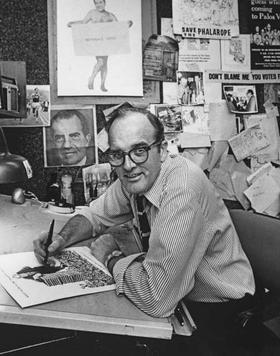
Paul Francis Conrad was an American political cartoonist and winner of three Pulitzer Prizes for editorial cartooning. In the span of a career lasting five decades, Conrad provided a critical perspective on eleven presidential administrations in the United States. He is best known for his work as the chief editorial cartoonist for the Los Angeles Times during a time when the newspaper was in transition under the direction of publisher Otis Chandler, who recruited Conrad from the Denver Post.

Patrick Joseph Buchanan is an American paleoconservative political commentator, columnist, politician, and broadcaster. Buchanan was an assistant and special consultant to U.S. Presidents Richard Nixon, Gerald Ford, and Ronald Reagan. He is a major figure in the modern paleoconservative movement in America, and his writings, morals, values, and strategic thinking have continued to influence many paleoconservatives.

Samuel William Yorty was an American radio host, attorney, and politician from Los Angeles, California. He served as a member of the United States House of Representatives and the California State Assembly, but he is most remembered for his turbulent three terms as the 37th Mayor of Los Angeles from 1961 to 1973. Though Yorty spent almost all of his political career as a Democrat, he became a Republican in 1980.

Thelma Catherine "Pat" Nixon was First Lady of the United States from 1969 to 1974 as the wife of President Richard Nixon. She also served as Second Lady of the United States from 1953 to 1961 when her husband was vice president.

Robert Lowell Coover is an American novelist, short story writer, and T.B. Stowell Professor Emeritus in Literary Arts at Brown University. He is generally considered a writer of fabulation and metafiction.
Postmodern literature is a form of literature that is characterized by the use of metafiction, unreliable narration, self-reflexivity, intertextuality, and which often thematizes both historical and political issues. This style of experimental literature emerged strongly in the United States in the 1960s through the writings of authors such as Kurt Vonnegut, Thomas Pynchon, William Gaddis, Philip K. Dick, Kathy Acker, and John Barth. Postmodernists often challenge authorities, which has been seen as a symptom of the fact that this style of literature first emerged in the context of political tendencies in the 1960s. This inspiration is, among other things, seen through how postmodern literature is highly self-reflexive about the political issues it speaks to.

Viking Press is an American publishing company owned by Penguin Random House. It was founded in New York City on March 1, 1925, by Harold K. Guinzburg and George S. Oppenheim and then acquired by the Penguin Group in 1975.
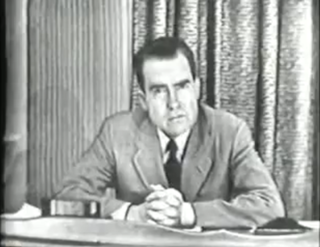
The Checkers speech or Fund speech was an address made on September 23, 1952, by Senator Richard Nixon (R-CA), six weeks before the 1952 United States presidential election, in which he was the Republican nominee for Vice President. Nixon had been accused of improprieties relating to a fund established by his backers to reimburse him for his political expenses. His place was in doubt on the Republican ticket, so he flew to Los Angeles and delivered a half-hour television address in which he defended himself, attacked his opponents, and urged the audience to contact the Republican National Committee (RNC) to tell it whether he should remain on the ticket. During the speech, he stated that he intended to keep one gift, regardless of the outcome: a black-and-white Cocker Spaniel that his children had named Checkers, thus giving the address its popular name.

Lawrence F. McCaffery Jr. is an American literary critic, editor, and retired professor of English and comparative literature at San Diego State University. His work and teaching focuses on postmodern literature, contemporary fiction, and Bruce Springsteen. He also played a role in helping to establish science fiction as a major literary genre.
Robert A. Dallek is an American historian specializing in the presidents of the United States, including Franklin D. Roosevelt, John F. Kennedy, Lyndon B. Johnson, and Richard Nixon. He retired as a history professor at Boston University in 2004 and previously taught at Columbia University, the University of California, Los Angeles (UCLA), and Oxford University. He won the Bancroft Prize for his 1979 book Franklin D. Roosevelt and American Foreign Policy, 1932–1945 as well as other awards for scholarship and teaching.

Silent Coup is a book written by Len Colodny [1938 - 2021] and Robert Gettlin that proposed an alternate explanation for the Watergate scandal that led to the 1974 resignation of US President Richard Nixon. The first edition was published in 1991, followed by an expanded second edition in January 1992.

Jules Joseph Witcover is an American journalist, author, and columnist.
Richard Woodward Seaver was an American translator, editor and publisher. Seaver was instrumental in defying censorship, to bring to light works by authors such as Samuel Beckett, Jean Genet, Henry Miller, William S. Burroughs, Hubert Selby, Eugène Ionesco, E.M. Cioran, D.H. Lawrence, Jack Kerouac, Robert Coover, Harold Pinter and the Marquis de Sade.
Time, Inc. v. Hill, 385 U.S. 374 (1967), is a United States Supreme Court case involving issues of privacy in balance with the First Amendment to the United States Constitution and principles of freedom of speech. The Court held 6–3 that the latter requires that merely negligent intrusions into the former by the media not be civilly actionable. It expanded that principle from its landmark defamation holding in New York Times v. Sullivan.
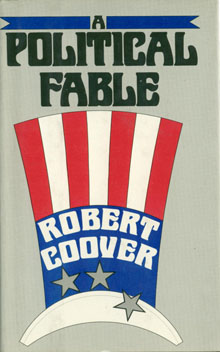
A Political Fable is a 1980 novella by Robert Coover. It was originally published, in slightly different form, in New American Review in 1968, under the title "The Cat in the Hat for President" and re-released under that same title in 2017.
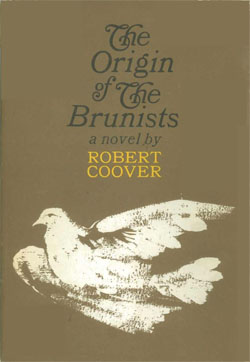
The Origin of the Brunists is Robert Coover's first novel. It tells the story of Giovanni Bruno, the lone survivor of a mine disaster that killed 97 of his co-workers, and the apocalyptic cult that forms around him.
Richard Nixon, the 37th President of the United States, has inspired or been portrayed in numerous cultural works.
